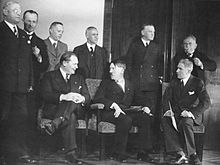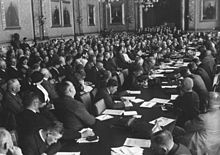Reinhold Quaatz
Reinhold Georg Quaatz (born May 8, 1876 in Berlin ; † August 15, 1953 there ) was a German lawyer and politician ( DVP , DNVP , CDU ). As the right hand of DNVP chairman Alfred Hugenberg , he accompanied the formation of the Hitler cabinet in 1933 and with it the destruction of the Weimar Republic . In the introduction to an edition of a diary, Hermann Weiss and Paul Hoser judge: “As a half-Jew who thinks nationally in a völkisch-nationalist party, he is practically at a loss, as a party politician who analyzes quickly and sharply, despite being well-read, was afflicted with many ideological prejudices of his epoch and his class To bring Quaatz to no simple denominator. "
Life and work
Reinhold Quaatz was born the son of a high school director. After attending a high school in Berlin, he studied law and economics at the University of Jena and the Friedrich-Wilhelms-Universität zu Berlin . In 1895 he became active in the Corps Guestphalia Jena . In 1898 he passed the first state examination in law. He entered the Prussian civil service as a court trainee. He completed his legal preparatory service at the Court of Appeal , passed the Second State Examination in 1903 and then worked as a court assessor in Berlin and Duisburg . His cousin was Ludwig Holländer (lawyer) , who acted as syndic of the Central Association of German Citizens of the Jewish Faith (CV).
Quaatz worked for the Prussian State Railroad in 1904/05 . Then he was a government assessor in Cologne , Münster and Kiel . From 1908 to 1911 he was a laborer in the finance department of the Prussian Ministry of Public Works , was there for the Governing Council appointed, and then acted as Eisenbahndirektion member of food , Poznan and Cologne.
During the First World War he was employed by the Royal Prussian Military Railway , organizing military transports. At the beginning of 1917 he became coordinator of the Ruhr-Mosel traffic. He was so well known as an expert on transport and trade issues that in December of the same year he was allowed to speak to the “Committee of Four”, an informal committee that Alfred Hugenberg had founded to influence public opinion. Hugenberg was also advised later by Quaatz.
When workers 'and soldiers' councils occupied the Cologne railway directorate on November 11, 1918 , they were shown to be outside the door by protest from Quaatz and the other directors. For Quaatz, such events were key experiences that shaped his attitude towards the left.
In 1919 he became a go. Government councilor and lecturer in the Prussian Ministry of Public Works. On the New Year of 1920 he resigned from civil service. That same year he was at the University of Cologne to Dr. rer. soc. oec. PhD. Afterwards Quaatz was from 1920 to 1923 lawyer at the Essen Chamber of Commerce . In addition, he acted as managing director of the Association of the Lower Rhine-Westphalian Chambers of Commerce, as editor of the economic news from the Ruhr district and as founder and head of the special purpose association of Northwest German business representations . From 1924 he worked as a lawyer and notary in Berlin.
In 1932/33 Quaatz was in discussion for the post of Reich Minister of Transport, among other things . In October, Quaatz, classified as a “ half-Jew ” by the National Socialists, was removed from the list of lawyers. The Dresdner Bank dismissed him, while he processed and lost in February 1936th Hugenberg, with whom Quaatz had published a book on urban development in 1933, wanted to cheat Quaatz for the share of the fee, although Quaatz had even refrained from being named as a co-author. In 1936, Hugenberg gave in.
On October 30, 1944 (after the assassination attempt on July 20, 1944 ) Quaatz's apartment was searched because he knew a pastor who belonged to the Confessing Church . Quaatz was also interrogated by the Gestapo . Otherwise he was not bothered until the end of the war.
The Soviet occupiers appointed him mayor of Lichtenrade , where he had lived since 1939. On June 16, 1945, he was released again for political reasons. After that he was only involved in the church. For example, he was a member of the Provincial Synod Berlin-Brandenburg and worked at the Church University of Berlin .
Political party
Quaatz joined the right-wing liberal DVP in 1919. Together with Albert Vögler , Hugo Stinnes and Oskar Maretzky , he soon formed a right-wing opposition to the party leader Gustav Stresemann . In 1923 they wanted to overthrow Reich Chancellor Stresemann, in whose cabinet Social Democrats were also represented, in order to achieve a government that included the far right DNVP.
In February 1924 Quaatz had talks with Stinnes, the German nationalists Hugenberg and Helfferich and other people. Quaatz then played a leading role in founding the National Liberal Association (NLV) in March , which, however, merged with the German nationalists in the Reichstag elections in May 1924 .
In the same year Quaatz emerged as a vehement opponent of the Dawes Plan , which, however, was ratified under pressure from industry and agricultural businesses. In the following years he worked with Paul Bang as editor of the freedom program of the DNVP.

Despite his Jewish mother, Quaatz was an anti-Semite. He himself believed that he was a victim of Jewish attacks and an allegedly Jewish press, but in fact he had to write about the DNVP in 1931: “My manner is not in keeping with my own people. Then there are the anti-Semitic prejudices. ”But Quaatz supported Hugenberg's rapprochement with the National Socialists, as he was more afraid of the Socialists and political Catholicism. He was also fascinated by the idea that Germany would be saved by an authoritarian leader and dictatorship.
After 1945 he was one of the founders of the CDU Berlin .
MP
Quaatz came to the Reichstag (Weimar Republic) in the Reichstag election in 1920 , to which he was a member until November 1933. From 1924 to 1928 he represented the Dresden – Bautzen constituency in parliament.
literature
- Hermann Weiß: Quaatz, Reinhold Georg. In: New German Biography (NDB). Volume 21, Duncker & Humblot, Berlin 2003, ISBN 3-428-11202-4 , p. 27 f. ( Digitized version ).
- Hermann Weiß , Paul Hoser (Ed.): The German Nationals and the Destruction of the Weimar Republic. From Reinhold Quaatz's diary 1928–1933 (= series of quarterly journals for contemporary history . Volume 59). Oldenbourg, Munich 1989, ISBN 3-486-64559-5 .
- Martin Schumacher (Hrsg.): MdR The Reichstag members of the Weimar Republic in the time of National Socialism. Political persecution, emigration and expatriation, 1933–1945. A biographical documentation . 3rd, considerably expanded and revised edition. Droste, Düsseldorf 1994, ISBN 3-7700-5183-1 .
Web links
- Literature by and about Reinhold Quaatz in the catalog of the German National Library
- Reinhold Quaatz in the database of members of the Reichstag
- Short biography in the files of the Reich Chancellery
- WorldCat
Individual evidence
- ↑ a b Hermann Weiss / Paul Hoser (ed.): The German Nationalists and the Destruction of the Weimar Republic. From the diary of Reinhold Quaatz 1928–1933 (series of the quarterly books for contemporary history 59). Oldenbourg, Munich 1989, p. 19.
- ↑ Kösener Corpslisten 1960, 70 , 319
- ↑ Larry Eugene Jones: The days before Hitler came to power. The diary entries of the "German national" Reinhold Quaatz. In quarterly journal for contemporary history , 1989 vol. IV. [1]
- ↑ a b Hermann Weiss / Paul Hoser (ed.): The German Nationalists and the Destruction of the Weimar Republic. From the diary of Reinhold Quaatz 1928–1933 (series of the Vierteljahrshefte für Zeitgeschichte 59), Oldenbourg: München 1989, p. 9.
- ↑ Dissertation: The fate of the unified concept in the German transport system. A criticism .
- ↑ a b c Hermann Weiss / Paul Hoser (ed.): The German Nationalists and the Destruction of the Weimar Republic. From Reinhold Quaatz's diary 1928–1933 (series of the Vierteljahrshefte für Zeitgeschichte 59), Oldenbourg: München 1989, p. 17.
- ↑ Hermann Weiss / Paul Hoser (ed.): The German Nationalists and the Destruction of the Weimar Republic. From the diary of Reinhold Quaatz 1928–1933 (series of the Vierteljahrshefte für Zeitgeschichte 59), Oldenbourg: München 1989, p. 12.
- ^ Hermann Weiss / Paul Hoser (eds.): The German Nationals and the Destruction of the Weimar Republic. From Reinhold Quaatz's diary 1928–1933 (series of the Vierteljahrshefte für Zeitgeschichte 59), Oldenbourg: München 1989, p. 21.
| personal data | |
|---|---|
| SURNAME | Quaatz, Reinhold |
| ALTERNATIVE NAMES | Quaatz, Reinhold Georg (full name) |
| BRIEF DESCRIPTION | German lawyer and politician (DVP, DNVP, CDU), MdR |
| DATE OF BIRTH | May 8, 1876 |
| PLACE OF BIRTH | Berlin |
| DATE OF DEATH | 15th August 1953 |
| Place of death | Berlin |

